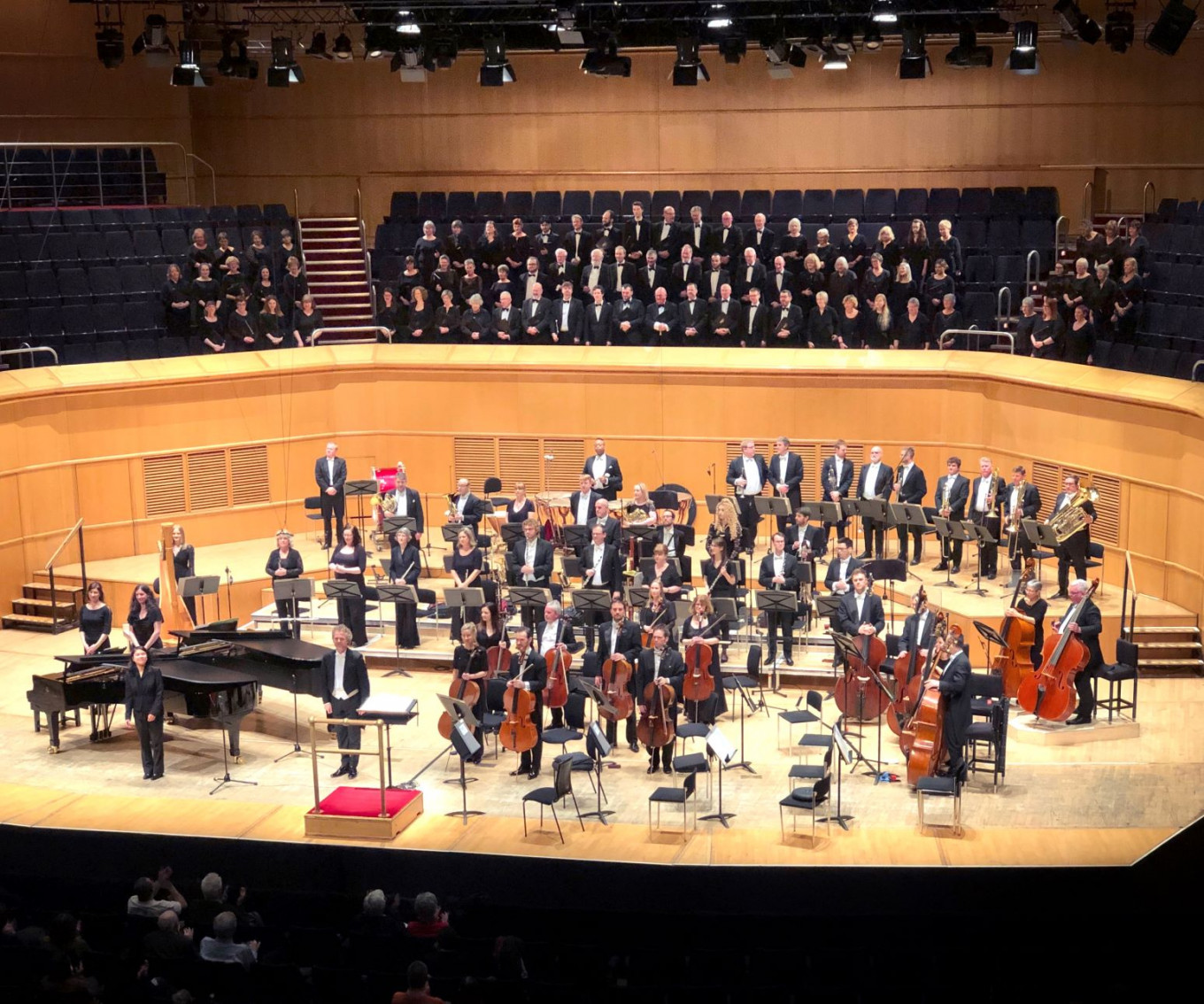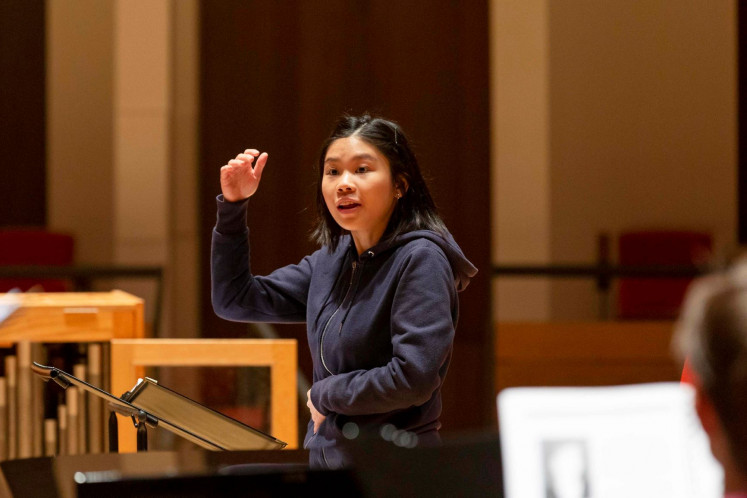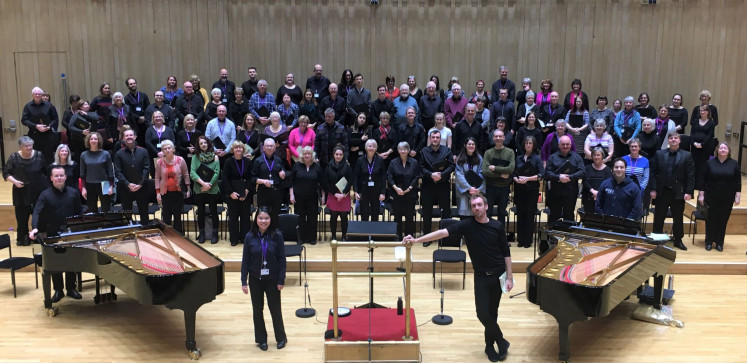Popular Reads
Top Results
Can't find what you're looking for?
View all search resultsPopular Reads
Top Results
Can't find what you're looking for?
View all search resultsSarah Charista takes the lead in choral conducting
Indonesian musician Sarah Charista makes history as the first woman and Asian to stand on stage as the choral conducting fellow for the Royal Scottish National Orchestra.
Change text size
Gift Premium Articles
to Anyone
L
eading a choir is not as simple as it looks. If conducting is only seen as a matter of arm and hand gestures, Sarah Charista begs to differ.
“Definitely not that,” she said in a phone interview from her dwelling place in Glasgow, Scotland in the United Kingdom.
“That’s what I thought, but then I was told that my gestures were flappy. Even in waving the hand, there is a structured system to it. Choral conducting is a matter of two-way communication between the conductor and the choir. And it’s far from easy.”
In action: Sarah Charista studied for her master’s in choral conducting at the University of Birmingham in the United Kingdom. (Courtesy of Sarah Charista/Victoria Beddoes)
Sarah, who was born in Surabaya, East Java, on Aug.14, 1995, was a student at Pelita Harapan University in Jakarta majoring in vocal music when she joined a choral conducting workshop in 2016.
Beforehand, she only had the experience of choir training and conducting some local choirs.
“I was asked to help with the training and conducting because apparently I was the only person studying music formally in the choirs,” she explained.
Mentored by Nicolas Fink, the current conductor for the West German Radio Choir (WDR Rundfunkchor), the weeklong workshop, which was organized by Goethe-Institut Indonesien, trained the participants to lead an effective rehearsal through body gestures and facial expression.
In order to avoid signaling unnecessary or vague gestures to the singers, the conductor has to be able to build communication with the choir members.
“The workshop was a luxury for us participants who never had formal training because we could also practice with the real choir on a stage with an audience, not only with our mentor or in front of the mirror. I learned in a hard way that I was too controlling toward the choir and Nic told me that my gestures were all over the place,” she said, referring to Fink.
Fink, however, told her she had the potential to be a choral conductor. His assessment through the relatively brief training period served as a turning point for Sarah, who at that time decided to pursue a career in choral conducting.
Her educational background has proven essential in the path she has chosen as she mastered the techniques of singing and vocalization, plus her musicianship and emotional maturity to deliver what was written between the lines in the music composition sheet.
“No one in the family has a talent in music. I only heard that one of my paternal grandparents used to play the violin but no information about whether he was a professional musician or not,” said Sarah.
As her family was unfamiliar with the profession of musician, it was a big decision to allow Sarah to pursue her master’s degree in choral conducting at the University of Birmingham in the UK in 2018 on a scholarship.
On top of that, she is an only child and had never traveled abroad alone, not even during two short holiday trips to Singapore.
“I guess that time was when my journey actually began,” she said, sipping her tea.
All ready: Sarah Charista (front left) poses during the rehearsal for “Brahms Requiem” with members of the Royal Scottish National Orchestra. (Courtesy of Sarah Charista/-)In her new campus, she was met by a plethora of challenges as she was given her own camerata – a small choir of dozens of members – to work on a concert to be held after two semesters.
“I was shocked after listening to their singing the first time. They were great singers and experienced,” she said.
To understand each other she and the choir members intensified communications, especially given Sarah’s ambition to have the choir, who usually sang solemn, gospel-like songs, to sing the upbeat Maluku folksong “Hela Rotane” for the thesis concert.
“The performance of the song has become the favorite part of the whole concert. It was a sort of achievement for me.”
The assistant musical director of her campus’ Summer Festival Opera received the Sir Alexander Gibson Memorial Fellowship for a one-year stint at Scotland’s National Orchestra starting November 2019 under chorus director Gregory Batsleer.
The fellowship is the only initiative of its kind in the UK given to choral conductors interested in furthering their experience in a professional setting.
Given the elusive opportunity to work at a very high level with the choir, Sarah took it as a new challenge working with a large scale choir that consisted of more than 120 members.
She was in charge of the fourth movement of Brahms’ “German Requiem” for a concert at the Glasgow Royal Concert Hall last February. During rehearsals, she found some unexpected difficulties in communicating with the choir members.
“They had no problems reading the music notes nor the German pronunciation as they have sung that very song so many times. The problem lay in how they delivered my interpretation of the song because they had sung it so many times in the same manner. I tried different approaches until they realized the changes I made to the composition. It was rewarding to see how they took it as a pleasant surprise. I could even see their eyes sparkle while singing the changed parts,” said Sarah.
“I’d say I was quite successful in imbuing a new color to the performance.”
Scotland’s The Herald on Feb. 3 published a review of the concert and gave praise to Sarah’s performance, mentioning her as “the young Indonesian musician [who] made the most of her opportunity, shaping the chorus-only movement with great clarity and beautifully fluid technique”.
“I am now different from five years ago. But I’m still not at the point of giving myself a stamp, a signature of my choral conducting. I’m still learning and I’m open to learning from as many choral conductors,” Sarah said.
The conductor has worked alongside world-class choral conductors such as Dane Thomas Søndergård, Briton Nicholas McGegan, and American John Mauceri but her current dream is to return to Indonesia to teach, although in virtual mode.
“My next project is to run a music appreciation class for better apprehension of classical music, to understand the drama in an aria as well as practicing singing the classical piece in its original language,” Sarah says.
“Indonesia is not yet familiar with classical music except among people in big cities, but it provides the basics in music and it is interesting to learn about it without having to set aside our root culture.” (ste)













